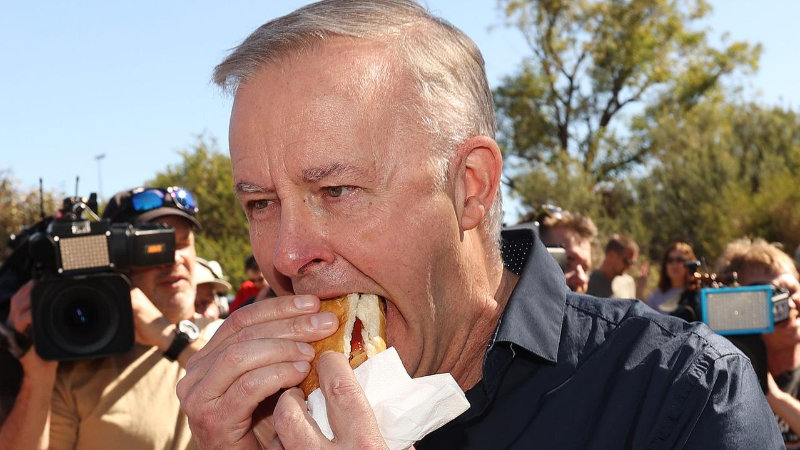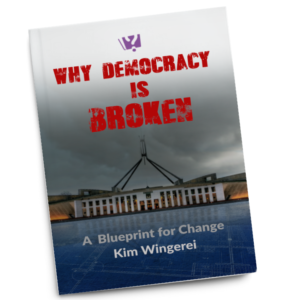
The Labor party added at least ten more seats to return with a clear majority, while a leaderless LNP will be licking their wounds and wondering where to from here. Kim Wingerei reports.
Updated Sunday, May 4 AM.
The headlines will be about a Labor landslide and Peter Dutton losing his seat. The Greens, too, look to have lost seats, despite a slight increase in primary vote overall, while Independents have increased their share of the vote (up 4.5%) and (at least) retained the same number of seats.
What is likely to be lost in the commentary is how, on aggregate, the two parties that have dominated Australia’s post-war governments had the lowest share of primary votes ever, with just about 65%, 1.5% down on 2022.
In his victory speech, Albanese said, “Labor has promised and Labor has delivered.” Even among diehard Labor voters, many will not entirely agree with that hubris, and recognise that Labor’s win (primary vote up 2.3% at the time of writing) is at least as much about the LNP losing (down by 3.9%), having run an awful campaign.
Who’ll replace Peter Dutton as Liberal Party leader is a story for another day. The backroom manoeuvring has already started, and who they pick will be a good indicator of which way the Liberal Party will swing: further to the right, or back to the middle? A middle now firmly entrenched by Labor.
The Senate is too early to call, although Labor would need another nine senators to have a majority, which is highly unlikely. And that is good for our democracy. Here at MWM lament that Rex Patrick seems unlikely to win back his SA Senate seat, albeit to our readers’ gain, as he will continue to be our transparency warrior, hoping for South Australia to gain an outstanding Senator.
Steady does it
Anthony Albanese’s strategy for his first team in office was to be a steady hand on the tiller, not to rock the boat too much, not to try anything too radical, to ensure his re-election. He took the risk of breaking a promise to repeal the previous Government’s tax cuts, which he survived. He botched the Voice referendum, which for a while looked like it could ruin his re-election chances, but sadly, most of non-indigenous Australia has already moved on from that.
Labor throttled its support for strong climate action by approving more coal mines and generally pandering to its big fossil fuel and mining donors to avoid controversial environmental decisions. When confronted with this, their answer has consistently been, “But Safeguard Mechanism,” a policy so complex that many of its proponents don’t understand it, and it is easily rorted. (More on that next week.)
Safeguard Mechanism is great … for big polluters and landowners, not so much for the planet
What we should all be thankful for is that the nuclear energy option is now likely off the table. What remains, though, is the AUKUS folly, which Labor inherited from the Morrison Government, but decided to pursue with vigour, for fear of being wedged by the LNP on “being weak on national security.” Hey, let’s not have $368B get in the way of our re-election chances!
It remains to be seen if common sense prevails and the new Government at least initiates a review of the plan. The first sign of this may be if AUKUS chief fanboy, Mr Please-Call-Me-Deputy-PM, Richard Marles, retains both that and his Defence Minister title.
Jim Chalmers will undoubtedly remain as Treasurer, as Labor has the right to proclaim itself superior economic managers after their first term. The economy is in reasonable shape, although the full effect of Donald Trump’s tariff shenanigans has yet to be felt.
That said, like all his recent predecessors, Chalmers has paid lip service to fixing the housing crisis, tinkering around the edges with the HAFF, handing out election candy to young voters in the form of first-home-owner assistance, and generally ignoring that the crisis is a question of supply not meeting demand. To fix it will take some hard decisions homeowners and property investors won’t be happy about, and it will take time. Much more than the three years of the next election cycle.
The Albanese Government now has a stronger mandate and the opportunity to pursue a more progressive agenda for reform. But will he?
Will Labor change?
One of Labor’s flagship promises in 2022 was the introduction of a Federal Anti-Corruption Commission, which resulted in the NACC, a watered-down body designed to operate out of the public eye and not do anything too dramatic. Commissioner Brereton’s obvious and dubious resistance to properly investigating and pursuing those responsible for Robodebt is perhaps the most egregious example.
Getting rid of Brereton would signal a willingness to strengthen the commission’s power and make its deliberations subject to public scrutiny. Changes that have broad support among the Greens and the Independents, meaning a good chance of passing it in the Senate without needing the support of the LNP. We can only hope.
Corruption Commission’s Robodebt failure tells of deeper problems with the NACC
The Greens and most of the Independent Senators will also be supportive of stronger and more decisive climate action, as well as introducing a gas reservation policy to reduce the pressure on electricity prices driven by export demand. Both measures have broad support in the electorate, but not with Labor donors. Who do you work for, Albo?
Whistleblower protection is another area where we should expect – or hope for – action. So far, Mark Dreyfus has been a disappointing Attorney General, looking the other way and refusing to intervene in the senseless persecution of David McBride and Richard Boyle, even when he had the power to do so, and failing to protect Dan Duggan from ending up in a US gaol.
We’ll (somewhat reluctantly) take Julian Assange’s words for crediting Anthony Albanese with ensuring his release. However, Richard Boyle had to succumb to pressure to avoid jail, while LendLease whistleblower Tony Watson is still fighting against impossible odds, as the ATO and the Government refuse to lend a hand to a man who saved Australia hundreds of millions of dollars.
Whistleblower persecutions. The cost of ignoring those who dare speak out.
But all of this pales into insignificance with Labor’s failure to stand unequivocally on the side of human rights in the people of Palestine’s fight against the Israeli killing machine, flouting its international obligations and dismissing the relevance of the International Court of Justice.
Will Penny Wong reappear as a strong advocate for human rights, will Albanese return to his roots as a supporter of nationhood for Palestine? Or will we continue to have a foreign policy anchored in our colonial past and the failing US empire?
How much damage will Trump and his wild band of incompetents have to do before an Australian Government dares to change course towards policies based on our geography and our strengths as an independent, research-rich nation?
And on that note, will Albanese have the courage to be true to his stated convictions and start the process of unshackling us from London SW1?
What’s next?
In her recent book, “Making Progress – How Good Policy Happens“, former Labor Minister Jennie Macklin writes at length about how proper reform takes time, a lot of effort from many committed people, deep understanding of issues, and a lot of patience in the very competitive world of politics.
She should know, having been involved in the introduction of the first Carbon Reduction Pollution Scheme, the Parental Leave scheme, the NDIS and many other reform initiatives under the Rudd and Gillard governments.
Reading her insightful book makes this writer question if the “art of policy making” has been lost. When was the last time a Federal Government championed lasting, meaningful reform? In an age of media and poll-driven politics, have our politicians lost their collective nerve to look for change beyond the next election?
Which is only three years away. And ‘Ay, there’s the rub’ – the short-term nature of our political discourse is holding Australia back. So many areas are screaming out for reform.
Housing is just one area where both the Federal and State governments keep doing the same thing, expecting a different result. Our universities have been turned into profit-making machines at the cost of academic excellence, and the school curriculum changes ever so slowly, while the AI revolution powers on without teachers and students being taught how to adapt.
So far, Labor’s idea of tax reform is changes to income bracket tax percentages and pre-election handouts, and we are still waiting on the long-promised changes to combat multinational tax avoidance.
At the very core of this hiatus is the ‘Particracy’, the two-party system run by career politicians whose main objective is to be re-elected. We welcome the influx of independents and micro parties into Parliament. It gives hope for more meaningful policy making by people who are there to represent their constituents, not their party.
Maybe that’s what the Greens should do, too: stop trying to be a party and let its candidates get on the independent bandwagon that voters clearly relate to in increasing numbers. Our democracy needs much more of them, and although three years is a long time in politics, it may not be enough for the LNP to find their mojo.
Therein lays opportunity for progress. Seize the moment, politics abhors a vacuum; there will always be someone to fill it.


